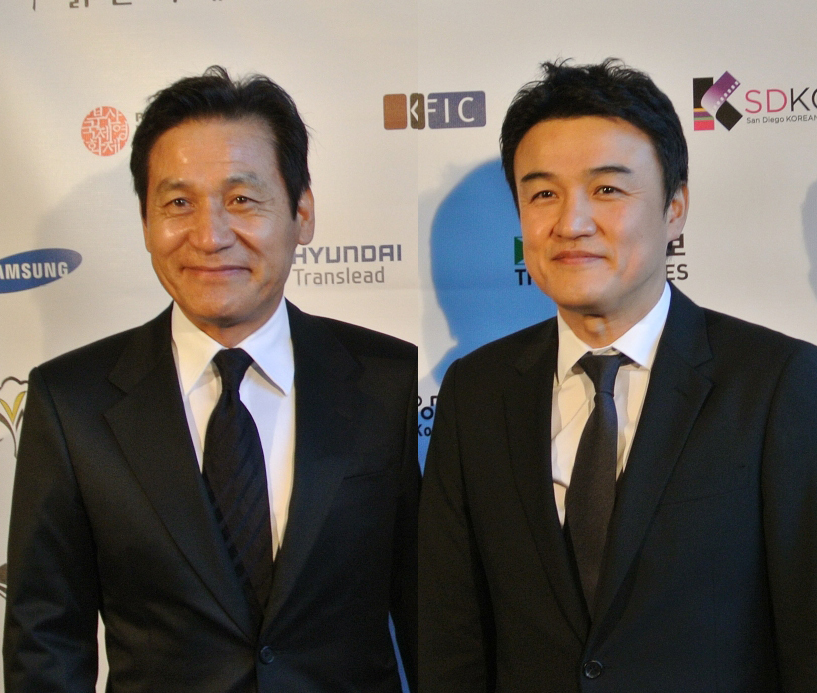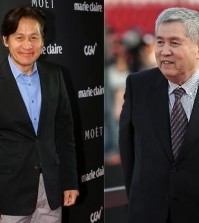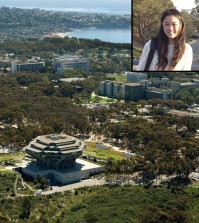- California Assembly OKs highest minimum wage in nation
- S. Korea unveils first graphic cigarette warnings
- US joins with South Korea, Japan in bid to deter North Korea
- LPGA golfer Chun In-gee finally back in action
- S. Korea won’t be top seed in final World Cup qualification round
- US men’s soccer misses 2nd straight Olympics
- US back on track in qualifying with 4-0 win over Guatemala
- High-intensity workout injuries spawn cottage industry
- CDC expands range of Zika mosquitoes into parts of Northeast
- Who knew? ‘The Walking Dead’ is helping families connect
Ahn Sung-ki and Park Joong-hoon attend San Diego Korean Film Festival
Two pillars of Korean cinema — Ahn Sung-ki and Park Joong-hoon — were the recipients of the Hong Chan Award at the second San Diego Korean Film Festival this weekend.
The festival was hosted by the Korean Cinematheque Foundation and ran for three days at UltraStar Mission Valley, featuring eight films and “Thread of Lies” director Lee Han.
Hong Chan, the namesake of the award, was the father of Bright World Foundation Director Hong Myung-ki and one of the first businessmen to bring Korean films to America.
The Korea Times’ Christine Ha sat down with Ahn and Park at the Doubletree Hotel in San Diego Saturday.
Q: How does it feel to receive the Hong Chan Award?
Ahn: We came to give congratulations to the festival and had no idea we’d receive an award. It’s the norm to come to a film festival bringing your project with you to share and discuss with the audience, but I’ll be returning home happy after receiving the award.
Park: I heard that Hong Chan was a person who had left behind a lot of achievements even before I was born. I’m thankful to have received the award, which was given by his son, who paid tribute to his ideals. I’m also thankful that he supported the film festival without limit.
Q: A few words on the film festival?
Ahn: I did a project with director Jung Chang-hwa, the director of the event, when I was a child actor. I want to express respect for his passion in creating a film festival like this, persisting and keeping his place for his juniors. I hope many good Korean films and good filmmakers, actors and directors come here to converse with audiences and become acquainted.
Park: Kim Dong-ho, who is the chairman of the Presidential Committee for Cultural Enrichment, also came here with us. He created the Busan International Film Festival and acted as a project director there. At first, no one believed in it. It was a film festival everyone doubted, but now it’s gone beyond being the pride of Korea to spread to Asia and the world. There will also be a day when those who attended today’s San Diego festival will look back in pride.
Q: What are the prospects for the Korean film industry?
Ahn: Theatre Scala is a movie theater, but it hasn’t been developed after Seoul city designated it a cultural property. I thought that was such a disappointment, but it means that the Korean film industry was in a bad state at the time. If it had been now, they would have preserved it. Recently, films have become technological digital, which means they can compete with Hollywood films. Even without too much production cost, the technology has made pictures look great. So now, the power of the story is crucial in films, and I think the stories are being created well, too. I’m hopeful.
Park: In the past, Korean films used to be referred to as “arson,” which carried with it scorn. Even up until the 80s, you were considered strange when you told people you did Korean films. But now, a lot of talent has come into the scene, which I think is why Korean films have gained power. The prospect of films becomes better when a lot of good movies are released. It’s a high-risk industry, so it’s hard to predict. You never know until before release. I’m hopeful that good films will come out because of the good talent.
Q: What are your future plans?
Ahn: Director Im Kwon-taek’s 102nd film, “Makeup,” was invited to the Venice Film Festival. It holds meaning because it was my first project with the director in a long time. I hope it’s a quality film that touches audiences. As an actor who survives on audiences’ support and love, I thank them hope for their unchanging interest.
Park: Following last year’s “Top Star,” which I directed, I’m preparing for a second film. I think I’ll continue to alternate between directing and acting. If I had to separate the two, I’d say that acting is harder work, but directing is more difficult. I survive on the love of audiences. I ask for their love, even if I may be across the seas.
















